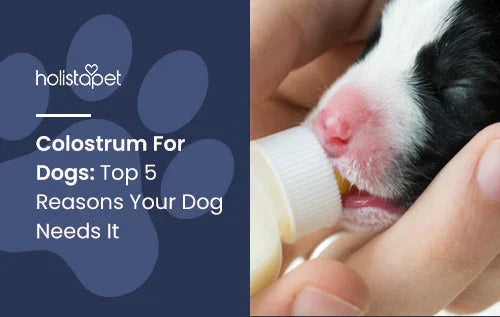Long walks, playtime at the park, indoor zoomies—your dog deserves to feel their absolute best! Fortunately, lysine for dogs can help with that. This superstar amino acid is like a built-in jetpack for your furry friend's health. From promoting strong muscles to supporting the immune system, lysine can help your pup live life to the fullest.
Hands down, lysine can significantly impact your furry friend's quality of life. Every pet parent will benefit from learning more about this key compound. Ready to learn more about how lysine can supercharge your dog's well-being? Our guide will show you exactly how to keep your pup happy, healthy, and thriving.
What Is Lysine?

Lysine, or L-lysine, is an essential amino acid that plays a big role in canine health. Amino acids are the building blocks of proteins, which are vital for nearly every function in the body. Unlike some other nutrients, dogs can't produce their own lysine. Instead, they need to get it from their diet, through food or supplements.
This powerful amino acid supports pets' immune response, tissue repair, and overall growth. Therefore, giving your furry pal enough L-lysine can help keep them strong, healthy, and full of boundless energy.
How Does Lysine Work?
Lysine supports our canine friends in several important ways. One of its primary roles is helping build proteins. Proteins are vital for muscle development, tissue repair, and overall development. Without enough L-lysine, dogs' bodies can't produce these critical proteins efficiently.
Additionally, lysine helps boost immunity, making it easier for pets to combat infections. It also aids in calcium absorption, which is crucial for strong bones. Overall, L-lysine is a key player in pushing pups toward optimal health.
Is Lysine Safe for Dogs?
Absolutely, lysine is safe for dogs when given in the right amounts! It is actually well-tolerated by most canines.
However, it's always a good idea to consult your veterinarian before changing diets or starting any new supplement for your pet. Doing so will ensure the foods and supplements you choose suit your animal companion's needs.
While L-lysine supplements are generally safe, giving too much can still cause minor side effects (more on this later). To avoid unwanted reactions, always follow the recommended dose and keep an eye on your pet.
How Can Lysine Benefit My Dog’s Health?

Lysine can significantly benefit your dog's quality of life in several ways. We'll discuss them in more detail later, but here's a quick overview of L-lysine's benefits for canines:
- Potentially Aids in Collagen Production
- May Help Synthesize Other Proteins
- May Improve Calcium Absorption
- Supports the Immune System
Aids in Collagen Production
Lysine is a key player in producing collagen in the body. Collagen is vital for dogs' skin, bones, and connective tissues. It helps maintain the structure and strength of these tissues, which helps keep pups agile and active.
If L-lysine is lacking, collagen creation can slow down. This slowdown can then lead to weaker joints and slower wound healing in pets.
L-lysine not only keeps dogs' joints and bones strong; it also promotes healthy skin and a shiny coat. As you probably already know, a well-nourished coat can indicate good pet health.
Helps Synthesize Other Proteins
Lysine helps synthesize other proteins in canines' internal systems. Proteins like enzymes, hormones, and antibodies are vital for muscle development, tissue repair, and overall growth.
In both humans and animals, L-lysine helps synthesize proteins such as collagen, elastin, and keratin. Without enough of this amino acid, the body can't efficiently create these important proteins.
When dogs have enough lysine, their muscles can develop properly and their tissues can repair quickly after injuries. This assistance can help keep pets active and energetic through all life stages.
May Improve Calcium Absorption
Enough lysine can help enhance how dogs' bodies absorb and use calcium. Calcium is crucial for maintaining strong bones and teeth. It also aids in muscle function and nerve transmission.
This improved absorption can lead to strong bones and reduced risk of fractures. When pets receive consistently adequate amounts of L-lysine, they can remain active for years and years.
Related Posts: Calcium Supplements for Dogs [Natural Bone Support]
Supports the Immune System
Lysine helps boost the formation of antibodies and other immune cells that protect humans and animals from viruses and bacteria. It supports dogs, in particular, by helping them fight off infections and stay healthy.
With enough supply of this important amino acid, canines suffering from illnesses or coming from surgery can recover faster. This support is especially important for vulnerable pets like frail or aging animals.
What Are the Natural Sources of Lysine for Dogs?

Luckily, lysine is in many natural sources. You can find it in various meat and fish products. Chicken, beef, and lamb are excellent sources, making them yummy additions to your dog's feed.
Eggs, cheese, and certain legumes can also be good sources. These foods not only provide L-lysine but also other essential nutrients. Certain high-quality commercially available pet foods may also contain enough of it.
In general, a balanced diet must always come first. Supplements can help in case natural sources are just not enough. Also, always consult your veterinarian to assess your pet's diet and see if they need supplements.
Related Post: Top 9 Superfoods for Your Dog's Diet
What Is Lysine Deficiency in Dogs?
Lysine deficiency happens when dogs don't get enough of this essential amino acid in their diets. Since dogs can't produce L-lysine on their own, they rely on food or supplements to meet their nutritional needs.
Poor-quality pet foods and unbalanced diets can lead to a deficiency. This deficiency can weaken your dog's ability to produce proteins, among other unpleasant results. Therefore, ensuring your pet has enough lysine should be high on your priority list.
What Are the Signs and Symptoms of Lysine Deficiency in Dogs?
Lysine deficiency can show up in several ways. Here are some common symptoms to watch for:
- Reduced Energy Levels. A deficiency can decrease energy and muscle maintenance, causing companion animals to become more sluggish than usual.
- Dull Coat. A deficiency can also cause dull and rough coats because of poor collagen production.
- Weakened Immune System. A deficiency can affect the formation of antibodies and immune cells, making pets more prone to infections and illnesses.
- Poor Growth and Healing. Puppies might not grow as expected, and wounds may heal more slowly because of poor protein synthesis.
If you notice any of these signs, talk to your veterinarian, stat. Discuss your dog's diet and ask if you need to consider supplements for your pup.
What Lysine Supplements Are Available for Dogs?
There are various lysine supplements available for our canine pals. They come in different forms, so finding one that suits your dog's preferences and needs should be easy. You can pick from:
- Chews. Soft chews are a hit because they double as treats. We recommend HolistaPet's Muscle Support Chews for Dogs for its tasty and convenient formula. It has a natural blend of amino acids (including lysine) and other muscle-building ingredients to support an active canine lifestyle. Plus, your pup will love its peanut butter and banana flavor!
- Powders. You can mix lysine powder into your dog's food, which is great for picky eaters. Simply blend the powder with the meals you feed your pup.
- Gels. Liquid gels are another alternative. Administer these directly into your dog's mouth or mix them with food. This option offers some flexibility in how you administer the supplement.
Always consult your veterinarian before starting any new supplement. Doing so will ensure you pick the best one for your dog's health and well-being.
What Is the Recommended Dosage?
The recommended dose of lysine can vary based on the dog's size, age, and health status. Veterinarians commonly suggest around 500-1,000 mg of L-lysine per day, divided into two doses.
For puppies or smaller breeds, the dose might be less. Meanwhile, larger breeds may require a higher amount.
Simply follow the dosing instructions on the supplement packaging. You can also ask your veterinarian for a more tailored dose for your pet.
Are There Any Side Effects?
Lysine supplements are generally well-tolerated by dogs. However, some may still experience minor side effects. Even if the symptoms are commonly mild, responsible pet parents must still be aware of them.
What should you look out for? Mainly stomach troubles or diarrhea. If you notice these tummy issues after giving your pet their supplement, it might be due to a high initial dose.
When it comes to our pets, safety always comes first. To minimize the risk of side effects, start with a lower dose and gradually increase it as your vet recommends. Always monitor your dog's reaction to the supplement and visit your veterinarian if you notice any symptoms. Your vet can help adjust the dose or recommend an alternative solution if needed.
Are There Any Contraindications?
While lysine is generally safe for most dogs, it might not be suitable in some cases. Dogs with specific health conditions, such as kidney disease or liver disease, should use L-lysine supplements with caution.
If your pet is undergoing treatment and taking medication, definitely discuss additional supplementation with your vet first. Also, taking many supplements and the resulting interactions may affect or counter lysine's benefits.
It's always best to get the expert opinion of your veterinarian. They can be your best partner in ensuring lysine stays safe and beneficial for your four-legged friend.
The Bottom Line - Lysine for Dogs
At this point, we can all agree that lysine isn't just an amino acid. It's actually like a superhero for your pup's health. By ensuring your pet gets enough L-lysine through their food or quality supplements like ours, you're helping them thrive and live their best life. Remember, a healthy pup makes for a happier home!



 CBD Oil for Dogs - Fast Acting
CBD Oil for Dogs - Fast Acting
 Chicken Flavored CBD Oil For Dogs - Easy Dose
Chicken Flavored CBD Oil For Dogs - Easy Dose
 Salmon Flavored CBD Oil For Dogs - Highly Rated
Salmon Flavored CBD Oil For Dogs - Highly Rated
 CBG Oil for Dogs and Cats - Loved by Thousands
CBG Oil for Dogs and Cats - Loved by Thousands





Leave a comment
All comments are moderated before being published.
This site is protected by hCaptcha and the hCaptcha Privacy Policy and Terms of Service apply.